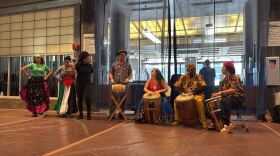ANDREA SEABROOK, host:
In Baghdad today, gunmen in Iraqi army uniforms kidnapped as many as 30 people at the office of the Iraqi Red Crescent. It's the latest of several mass kidnappings in the Iraqi capital in recent months. The ongoing violence has taken a toll on life in the city, especially at night. Most residents try to be locked in their homes by 7:00 p.m. because it's just too dangerous to be out.
Baghdad used to be famous for its restaurants and clubs, where music and even liquor flowed. Now it's hard to find a drink. As NPR's Corey Flintoff reports, Iraqi liquor sellers and drinkers are being forced underground.
COREY FLINTOFF: Sa'ad Nadawi(ph) is a bachelor. The burley 46-year-old lives at the company where he works as a truck driver and he keeps house for himself. On any given night, he eats his evening meal on a low coffee table in front of the couch. His place is flanked on one side by a bottle of gin, and on the other by a bottle of scotch.
Mr. SA'AD NADAWI (Truck Driver): (Through translator) My case is probably rare.
FLINTOFF: He pours himself a double shot.
(Soundbite of pouring)
Mr. NADAWI: (Through translator) I am not married, so I live a lonely life. At night, I resort to drinking. If I were married, I wouldn't drink.
FLINTOFF: Nadawi says he drinks to relax from a long day of frustration and danger, driving the streets of Baghdad. He says his drink of choice is Clan, a counterfeit variety of scotch with a convincing Clan McGregor label and a raw, unconvincing taste.
Mr. NADAWI: (Through translator) The type of liquor we get in this country is not genuine, because this bottle of whiskey costs only seven dollars.
FLINTOFF: Nadawi's whiskey is delivered to him by his neighborhood dealer, a small fair-haired man who perches on the opposite couch. Traditionally, liquor in Iraq has been sold by Christians who are exempt from the Koran's ban on alcohol. Nadawi's neighbor deals from his house.
Unidentified Man (Liquor Dealer): (Through translator) I only sell alcohols within my neighborhood and to my close friends, people I can trust. I can't open a liquor shop because I'm afraid I'll get killed or kidnapped.
FLINTOFF: It's not an idle fear. Since the U.S. invasion in 2003, dozens of liquor stores have been bombed, their owners murdered by fundamentalist Muslims who believe they're enforcing the Koran's prohibition of alcohol. The dealer has also been a prey to robbers and bullies.
Unidentified Man: (Through translator) I was attacked one day by a group of men. They punched me in the eye. I was bleeding and it was all for liquor.
FLINTOFF: He says the incident made him more cautious because he doesn't expect the police to look out for him. The few remaining liquor stores open in Baghdad don't rely on the police either. They rely on their location - across the street from one entrance to the heavily fortified Green Zone, where they're under the eyes and guns of Iraqi soldiers.
Mr. SALEEM ISHMAEL(ph) (Store Owner): (Through translator) This shop has been selling alcohol for more than 35 years.
FLINTOFF: The shop opened before Saleem Ishmael was born. Now 26, he keeps the family business open only during the daylight hours.
Mr. ISHMAEL: (Through translator) Your shop might get blown up. They tell you that liquor is forbidden.
FLINTOFF: Ishmael says the price of liquor has doubled because it's so difficult to bring alcohol into the country.
Mr. ISHMAEL: (Through translator) Trucks are being attacked and set on fire. So if a bottle of alcohol costs two dollars, the trader sell it for seven dollars, because he has to compensate for the burned truck.
FLINTOFF: Ishmael's whiskey is all counterfeit, made in Cyprus.
Mr. ISHMAEL: (Through translator) People cannot afford to buy expensive liquor. They're drinking because of their anxieties and fears. Where do they go? They take a bottle and drink at home.
FLINTOFF: In his home, truck driver Saad Nadowi(ph) pours himself another drink.
Mr. SAAD NADOWI (Truck Driver): (Through translator) Sometimes one drink is enough for me, other times I'll drink about a quarter of the bottle.
FLINTOFF: He raises the glass in his big hand, looks appraising at the contents.
Mr. NADOWI: (Through translator) The drink compensates for a lot of things I suffer from, hardships of work and my personal life - not having a wife, not have a home. When I sit and drink, I forget all these things. But you cannot really forget for more than a few hours.
FLINTOFF: Nadowi's attitude has grown common in the war zone. But as he's found out, forgetfulness in any form is an increasingly rare commodity in Iraq. Corey Flintoff, NPR News, Baghdad. Transcript provided by NPR, Copyright NPR.





